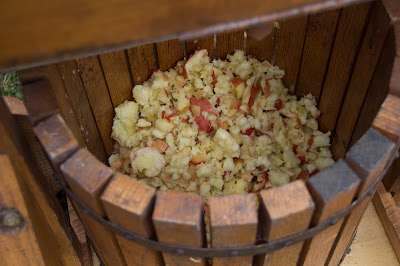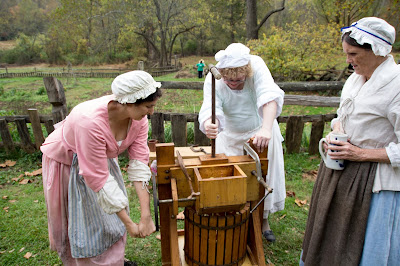Last week, I wrote a post entitled "Legends Never Die," which discussed the various lies or myths that I hear on a regular basis at the Colonial era site I work at. If you didn't read that one head on over to that post.
As someone who spends most of her time researching and reading the latest research in my field, I thought that visitors would be happy to be receiving the most up-to-date research. I was very wrong.
I've spent a lot of time wondering why history myths prevail. There are many myths in history that captivate the minds of many and they are terribly hard to kill. We typically learn these myths as children: "George Washington had wooden teeth."
In music, they call a song that prevails, regardless of it's quality, an "earworm." Some common earworms include the I Dream of Jeanie theme song or anything by pop sensation, Ke$ha. Likewise history's "yesteryear worms" are wriggly, little buggers that stick in minds and are a terrible thing to try and get rid of.
Reasons Myths Prevail:
- Habit: Some of these things are told just as a force of habit and we all know how hard it is to change habits. Also many of these myths are passed around from person to person.
- Good Stories: Myths typically make interesting stories or answer the pesky question "why" when it would otherwise go unanswered. People love a good story and myths give it to them.
- Confirmation: People like to hear reaffirmation for their beliefs about a time period and many myths cater to this. People like to hear just how horrible it was in the past because it fits with their view of the past. There are many myths that center around poor living conditions in the past.
- Superiority: Some myths make the teller feel more intelligent. Many myths make the teller feel intelligent because they know something clever that their peers don't know. Likewise, people also like to hear about how "backwards" people were in the past.
As history lovers, it's our job to dispel these false impressions of the past. When confronted with a person asking about or telling a myth, the best course of action is typically to correct them in a polite manner such as "Some people theorize that this is true, but here is a reason it is probably not true," or " Historians believed that previously but new research has suggested that 'X' is not the case."
What myths have you been hearing lately in history?
As someone who spends most of her time researching and reading the latest research in my field, I thought that visitors would be happy to be receiving the most up-to-date research. I was very wrong.
I've spent a lot of time wondering why history myths prevail. There are many myths in history that captivate the minds of many and they are terribly hard to kill. We typically learn these myths as children: "George Washington had wooden teeth."
In music, they call a song that prevails, regardless of it's quality, an "earworm." Some common earworms include the I Dream of Jeanie theme song or anything by pop sensation, Ke$ha. Likewise history's "yesteryear worms" are wriggly, little buggers that stick in minds and are a terrible thing to try and get rid of.
Reasons Myths Prevail:
- Habit: Some of these things are told just as a force of habit and we all know how hard it is to change habits. Also many of these myths are passed around from person to person.
- Good Stories: Myths typically make interesting stories or answer the pesky question "why" when it would otherwise go unanswered. People love a good story and myths give it to them.
- Confirmation: People like to hear reaffirmation for their beliefs about a time period and many myths cater to this. People like to hear just how horrible it was in the past because it fits with their view of the past. There are many myths that center around poor living conditions in the past.
- Superiority: Some myths make the teller feel more intelligent. Many myths make the teller feel intelligent because they know something clever that their peers don't know. Likewise, people also like to hear about how "backwards" people were in the past.
As history lovers, it's our job to dispel these false impressions of the past. When confronted with a person asking about or telling a myth, the best course of action is typically to correct them in a polite manner such as "Some people theorize that this is true, but here is a reason it is probably not true," or " Historians believed that previously but new research has suggested that 'X' is not the case."
What myths have you been hearing lately in history?










